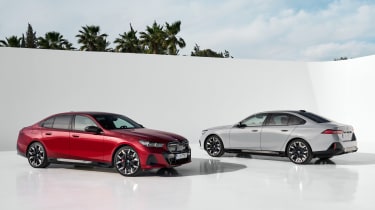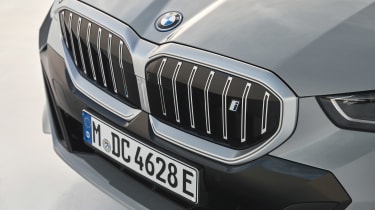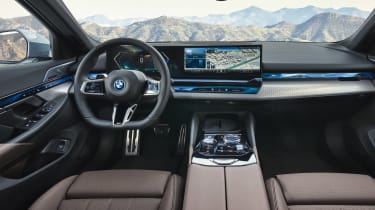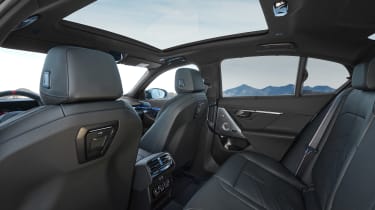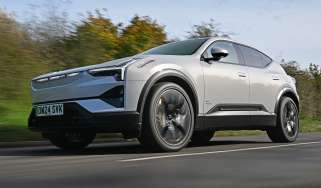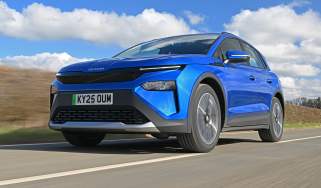BMW i5 breaks cover as 5 Series EV
BMW has unveiled an all-electric version of its long-running 5 Series, with a range of up to 362 miles
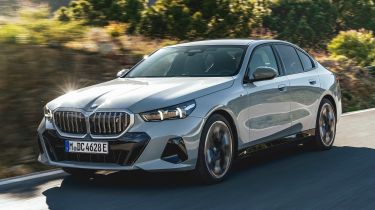
BMW is on the EV offensive, with the maker already offering five different electric models. However, the latest addition to its ‘i’-badged lineup is perhaps the most important, as it marks the first time the brand’s longest-running model has ever been offered without an engine. Say hello to the BMW i5, the first all-electric 5 Series.
Due to go on sale this October, the BMW i5 saloon will rival the likes of the Mercedes EQE and Tesla Model S. A Touring estate version will join the lineup in 2024, but won’t face much competition at launch; the budget-friendly MG5 EV and the much more premium Porsche Taycan Cross Turismo and Taycan Sport Turismo are the only electric estates currently on sale. The Audi A6 Avant e-tron will be a direct rival when it also arrives in 2024, however.
At launch, the electric 5 Series will be offered in two flavours; the entry-level i5 eDrive40 will start from £73,200 and is powered by a single, rear-mounted electric motor with 322bhp. This is mated to an 81.2kWh battery which, according to BMW, will provide a maximum range of between 296 and 362 miles depending on specification. The sprint from 0-62mph will take just six seconds – quicker than a petrol-powered 520i.
Sitting at the pinnacle of the i5 range is the i5 M60 xDrive which, as its name suggests, has been tinkered with by BMW’s sporty ‘M’ division and comes fitted with xDrive four-wheel-drive. The latter comes courtesy of a dual-electric motor setup producing a hefty 593bhp and 890Nm of torque. BMW says the hot i5 will reach 62mph in 3.8 seconds and continue onto a top speed of 143mph.
The BMW i5 M60 xDrive uses the same 81.2kWh battery pack as its more sedate eDrive40 sibling, meaning range drops slightly to between 283 and 321 miles. Both cars also get access to 205kW ultra-rapid charging which, if you can find a fast enough public charger, can top up the i5 from 10-80% in around half an hour.
BMW’s design approach has come under scrutiny in recent years, with models such as the electric BMW iX and i4 being lambasted for their oversized kidney grilles. No doubt with this in mind, the BMW i5 has a more conventional design than its siblings, with a much more conventional look. The i5’s kidney grille incorporates a vertical slat design on non-M models, while high-performance cars get an illuminated gloss black panel.
Design cues from several other BMW models can be found elsewhere on the exterior of the i5. The creases in the bonnet are somewhat reminiscent of the petrol-powered BMW M3, while the electric 5 Series’ headlights and tail lights look to almost be directly pinched from the iX1 and i7 respectively.
The BMW i5 measures 10cm longer and 3cm wider than the outgoing petrol and diesel 5 Series. This has allowed BMW to create a more rakish profile – no doubt in order to benefit aerodynamics – while simultaneously improving legroom in the rear. BMW says the i5’s boot offers 490 litres of space, which is around 20 litres more than what you’ll find in the i4.
Mercedes has recently been dominating the posh EV market in terms of in-car technology, with the EQE’s 56-inch Hyperscreen infotainment system spanning that car’s entire dashboard. While the i5 doesn’t quite match the Merc’s level of screen real estate, it does indeed bring with it much of BMW’s latest technology, as seen on the flagship i7 limousine.
If you’ve sat in a BMW of late, you’ll be familiar with the ‘Curved Panel’ that sits atop the i5’s dash. This runs the brand’s latest iDrive software and comprises a 12.3-inch digital instrument cluster alongside a huge 14.9-inch touchscreen in the centre.
Perhaps more interesting is what these two screens sit above; running almost the full width of the i5’s dashboard and into the door panels is the ‘Interaction Bar’. This touch-sensitive display replaces traditional wood or metal trim and incorporates several functions like the climate controls – it even changes colour in accordance with the ambient lighting that illuminates the rest of the cabin.
EVs are all about sustainability so it’s only right that the BMW i5’s interior comes wrapped in vegan leather as standard – BMW has said its Merino leather will be offered as an option, though. Other notable interior items include a toggle switch replacing the traditional club-shaped BMW gear selector, a large single-panel panoramic sunroof and a squared-off steering wheel like you’ll find in the larger iX.
As mentioned, the BMW i5 will go on sale in October, with first deliveries towards the end of 2023. The electric 5 Series will also be sold alongside a new petrol-powered variant – no diesel will be offered in the UK – with the pair looking almost identical.
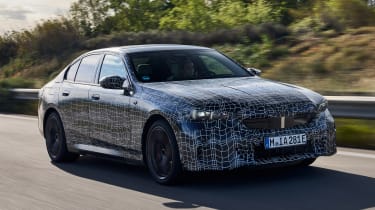
BMW i5 prototype review
It’s important to manage expectations when it comes to test driving a new car, but with BMW’s strong track record with EVs – the iX and i4 in particular are amongst the most well-rounded offerings in their respective classes – we were pretty excited to try out the new plug-in 5 Series.
Straight off the bat, the BMW i5 delivers the same signature blend of sportiness and comfort that has become a trademark of the Munich-based brand’s cars over the past few decades. In fact, during what was only a short amount of time with the prototypes, we believe the electric 5 Series may be even more capable than ever – able to offer an even more sumptuous ride and engaging driving experience.
This is all thanks to a sophisticated chassis setup; all BMW i5 models come equipped with air suspension at the rear, however, our test cars were also outfitted with adaptive suspension dampers and rear-wheel-steering. The result is a ride that feels composed – even over the biggest of bumps – with the i5 cruising along in a silent and unflappable manner.

A perfect storm of extra chassis stiffening, a low centre of gravity courtesy of the battery pack and sharp steering also make the BMW i5 startlingly good to drive. It feels a lot more nimble than its projected two-tonne-plus weight may suggest, while the rear-wheel-steering setup not only makes the i5 more manoeuvrable at low speeds, but also more agile and stable when on the move.
We sampled both the entry-level i5 eDrive40 and the fire breathing M60 model. Both, as you’d expect from an EV, offer expeditious acceleration, with the base car’s roughly six second 0-62mph time being more than rapid enough for most buyers.
The xDrive M60 feels blisteringly quick, if a tad unnecessary. Despite its dual-motor setup, both cars feel similarly smooth and easy to drive, with the latter providing just a slightly sharper kick in the back whenever you put your foot down.
While the electric 5 Series may not offer the same glossy Hyperscreen infotainment and 400-mile range as its Mercedes EQE rival, it looks to offer a much more refined and dynamic drive, which may easily persuade some buyers. Things could not look much better at this stage for the i5 and we look forward to trying out the production-ready car in the coming months.
Recommended

EV Deal of the Day: budget-friendly Ford Capri for just £234 a month

EV Deal of the Day: practical Vauxhall Grandland Electric for only £199 per month
Most Popular

EV Deal of the Day: budget-friendly Ford Capri for just £234 a month
